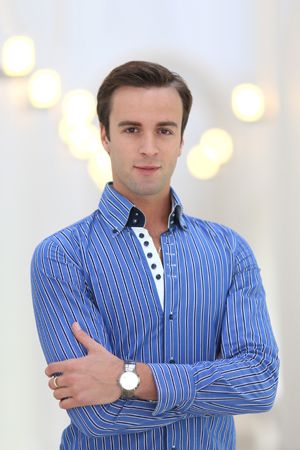
26 October 2024 | |
3 November 2024 | |
14 November 2024 | |
16 November 2024 |
Konstantin Zverev as Rothbart, the evil sorcerer who tries to keep Odette under his spell of “swan by day, woman by night,” matched her drama. His line was lean and elegant, his movement clean and never superfluous.
The Examiner
The dancer’s aristocratic and ‘thoroughbred’ looks also project themselves onto his performing style: even when not moving his Oberon is a sleek and polished ruler whose wishes it is incredibly hard to refuse.
Kommersant
Konstantin Zverev succeeded in bringing passion to life as Espada. He literally enveloped the entire stage space with the expressiveness and passion of his performance. It was impossible to tear your eyes away from his magnificent ports de bras with the scarlet cape.
PRO Dance
• Prize-winner at the II International Ballet Dancers’ Competition (Seoul, 2009, 1st prize).
Born in Leningrad.
Graduated from the Vaganova Academy of Russian Ballet in 2004.
Joined the Mariinsky Ballet in 2005.
Repertoire includes:
Giselle (Count Albrecht, Hans); choreography by Jean Coralli, Jules Perrot and Marius Petipa;
La Sylphide (Gurn); choreography by August Bournonville,
La Bayadère (the Slave, Indian Dance); choreography by Marius Petipa, revised version by Vladimir Ponomarev and Vakhtang Chabukiani,
The Sleeping Beauty (Prince Chéri); choreography by Marius Petipa, reconstruction of the 1890 production by Sergei Vikharev,
The Sleeping Beauty (Princess Aurora’s Suitors); choreography by Marius Petipa, revised version by Konstantin Sergeyev,
Le Réveil de Flore (Apollo); choreography by Marius Petipa and Lev Ivanov, revival of the 1894 production,
Swan Lake (Prince Siegfried, von Rothbart); choreography by Marius Petipa and Lev Ivanov, revised version by Konstantin Sergeyev,
Raymonda (Abderakhman, Grand pas, Mazurka); choreography by Marius Petipa, revised version by Konstantin Sergeyev;
Don Quixote (Basilio, Espada); choreography by Alexander Gorsky,
Michel Fokine's ballets The Firebird (Ivan Tsarevich), Schéhérazade (Zobeide’s Slave),
George Balanchine’s ballets Theme and Variations, Jewels (Diamonds, Emeralds), La Valse, A Midsummer Night’s Dream (Oberon, Pas de deux from Act II) and Symphony in C (II. Adagio, IV. Allegro vivace),
The Nutcracker (the Nutcracker Prince); choreography by Vasily Vainonen,
The Fountain of Bakhchisarai (Vaslav, Young Men); choreography by Rostislav Zakharov;
Leonid Yakobson's ballets Shurale (Shurale) and Spartacus (Harmodius, The African),
Yuri Grigorovich's ballet The Stone Flower (Severian), The Legend of Love (the Vizier),
Romeo and Juliet (Romeo, Paris, Tybalt); choreography by Leonid Lavrovsky,
Le Jeune homme et la mort; choreography by Roland Petit,
The Young Lady and the Hooligan (Leader); choreography by Konstantin Boyarsky,
Carmen Suite (José, Torero); choreography by Alberto Alonso,
In the Night; choreography by Jerome Robbins,
Études; choreography by Harald Lander,
Frederick Ashton's ballets Marguerite and Armand (Armand), Sylvia (Orion);
Hans van Manen's ballets Variations for two couples and Adagio Hammerklavier, 5 Tango's, LIVE,
Anyuta (Artynov); choreography by Vladimir Vasiliev,
Cinderella (the Prince, Dance Teacher, Male Dance, Summer), The Little Humpbacked Horse (Gentleman of the Bedchamber, Gavrilo), Anna Karenina (Vronsky) and Concerto DSCH;
The Magic Nut (Hungarian Suitor, Pan); production by Mihail Chemiakin and choreography by Donvena Pandoursky,
Ondine (Tarantella); choreography by Pierre Lacotte,
The Golden Age (Sportsmen); choreography by Noah D. Gelber,
Le Sacre du printemps (the Praying Mantis); choreography by Donvena Pandoursky,
Diana Vishneva: Beauty in Motion (Pierrot lunaire),
Yuri Smekalov's ballets Bolero Factory (Wrath) and Presentiment of Spring (Yarilo),
Push Comes to Shove; choreography by Twyla Tharp,
Le Parc (soloist); choreography by Angelin Preljocaj,
In the Middle, Somewhat Elevated; choreography by William Forsythe,
Infra; choreography by Wayne McGregor,
Anton Pimonov's ballets Choreographic Game 3x3 and Bambi (the Chief Hunter),
The Bronze Horseman (Eugene); choreography by Rostislav Zakharov, Yuri Smekalov
Paquita (Andrés, Young Gypsy Man); choreography by Yuri Smekalov, reconstruction and staging of Marius Petipa's choreography (Act III Grand Pas) by Yuri Burlaka,
and Second I; choreography by Ksenia Zvereva,
The Four Seasons, Sous la coupole, A Flashback; choreography by Ilya Zhivoi,
Russian Dead Ends II; choreography by Maxim Petrov,
Coppélia (Coppélius), 12 (Petrukha), At the Wrong Time; choreography by Alexander Sergeev,
A csodálatos mandarin (Client); choreography by Yuri Possokhov.
Repertoire also includes:
Aria Suspended; choreography by Peter Quanz,
Orpheus in the Underworld (Kharon); choreography by Yuri Smekalov,
Adagio from the ballet Proust ou les intermittences du cœur; choreography by Roland Petit,
Maxim Petrov's Pavlovsk and Russian Overture,
SeasonS; choreography by Ilya Zhivoi,
as part of the project The Dreamers: Beyond; choreography by Maxim Petrov, Lose Yourself to Dance; choreography by Maxim Petrov and Ilya Zhivoi.
Since 2022 he has been a teacher and coach with the Mariinsky Ballet, rehearsing roles with Ruslan Stenyushkin, Roman Belyakov, Maxim Izmestiev.
